Star Trek: Discovery Is My Favorite 21st Century Star Trek
Hey, before we get started — this is the day! The paperback of Promises Stronger Than Darkness is out today! The legendary Captain Argentian, the galaxy's greatest hero, is back at last, and she's... getting drunk and disgracing herself. You can now get the whole of my young adult space fantasy trilogy in paperback. And if you want a signed, personalized, doodled copy, try Green Apple Books — they ship all over the USA.
Okay, with that out of the way... Let's talk Trek!
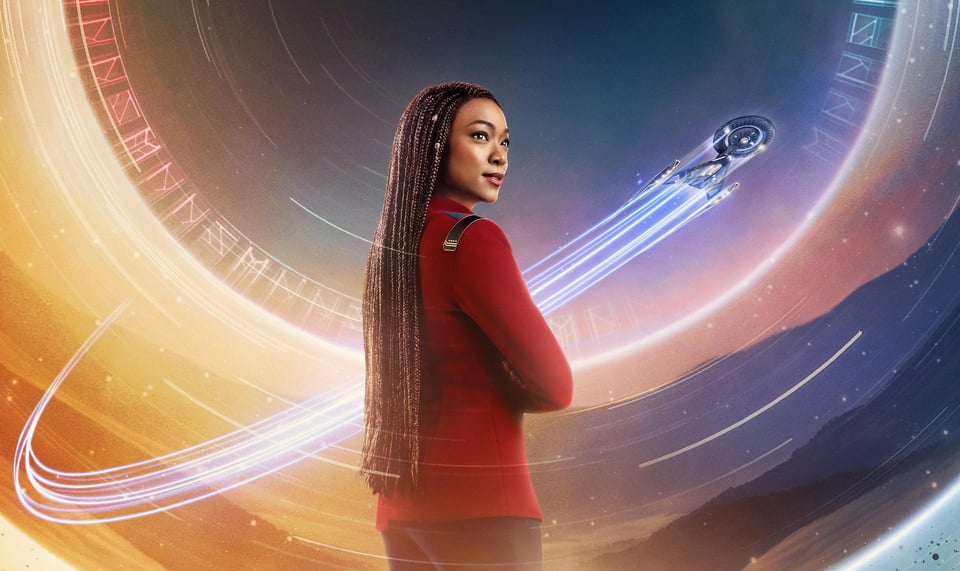
Back in 2022, I wrote a newsletter saying that you can love Star Trek: Strange New Worlds without putting down its sister show, Discovery. Which is true! I love both shows a whole lot. I also am obsessed with Lower Decks, which I rewatch pretty obsessively. I have a lot of love for Star Trek: Picard as well. And I've grown to appreciate Star Trek: Prodigy greatly since it moved to Netflix. We are truly blessed to have so much amazing Star Trek right now, and there's no need to pick one show over the others.
And yet, I still feel the need to come out and say it: Star Trek: Discovery is my favorite Trek of the 21st century so far.
The final season of Discovery launched last week, and I've been remembering why I adore this show so much. These characters have a special place in my heart, and I've been loving the exploration of Starfleet in the 32nd century, centuries after the other Trek shows. Discovery has become a thoughtful, expansive show that asks big, challenging questions, while also being a whole lot of fun.
Minor spoilers for the most recent episodes of Discovery below...
Discovery got off to a rocky start, to say the least. Annalee Newitz and I discussed the first season in the very first episode of our podcast Our Opinions Are Correct, and there was a lot to talk about. Season one leaned into being a war story, something that Deep Space Nine had already done brilliantly, and then veered into the Mirror Universe, which is one of those settings that gets less interesting the more you see of it. The first season featured a lot of upheaval behind the scenes, with co-creator Bryan Fuller leaving early on and the replacement showrunners being let go. Season two served as a backdoor pilot for Strange New Worlds, while also unspooling a somewhat tangled storyline about black ops and A.I. from the future.
Much like Star Trek: The Next Generation, Discovery really hit its stride in its third season. That's when the crew of the Discovery traveled forward into a far more distant future than Star Trek had ever explored before. The show gained a new lease on life and the Federation felt wide open once again, with so many new places and ideas to explore.
Season three of Discovery tells a nuanced, brutal story about rebuilding the Federation after a huge setback — and questions how far our heroes are willing to go restore what has been lost. Season four is a rich story of first contact, in which aliens from outside the galaxy have unknowingly unleashed a anomaly that threatens civilized worlds, and we have to learn to communicate with them before it's too late. Season five, without going into too much detail, is following up one of the most tantalizing stories from TNG, about the Progenitors, those ancient humanoids who seeded the galaxy with humanoid life long ago.
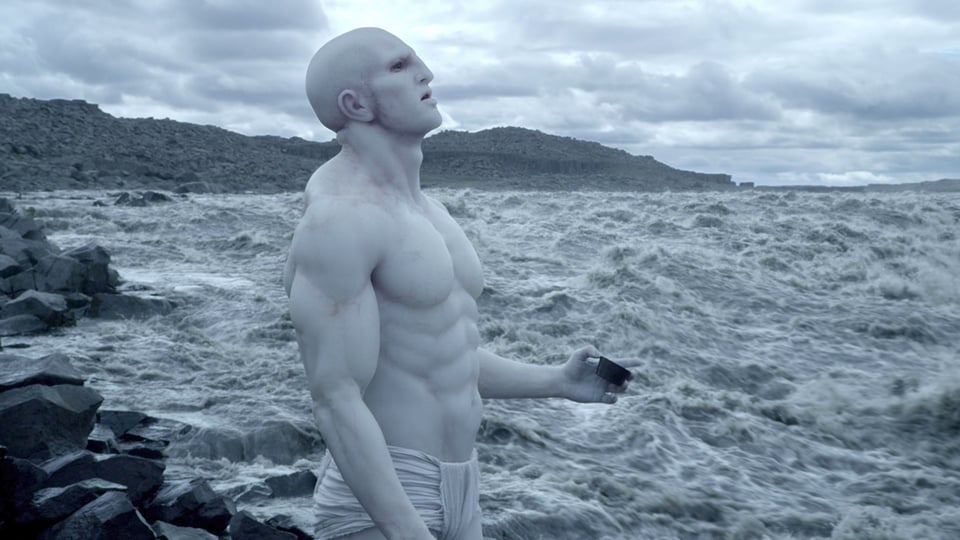
(Side note: this trope of ancient humanoids who spread their DNA around the galaxy is sorta adjacent to all those "Ancient Aliens" memes. It seems to emerge from Chariots of the Gods by Erich von Däniken, and it inspired the movie Prometheus as well. A huge part of my young-adult novel Victories Greater than Death is my attempt to deconstruct and subvert this trope, by having my ancient superscientists turn out to be basically eugenicists who wanted to breed humanoids to be part of a bizarre weapon. I originally wanted to have everyone refer to my ancient beings as the First Humanoids, but the She-Ra cartoon introduced some ancient creatures called the First Ones. So I decided to change them to the Shapers, which was honestly a little bit less catchy.)
Anyway, at this point, I should probably lay out some criteria. What makes for a good Star Trek show, in my view?
There are a few elements that seem really important. I love Star Trek when it explores humanism, using huge cosmic stories to show the resilience and ingenuity of human beings, and to explore what it means to be human. Exploration feels like a key part of Star Trek's DNA as well: not just traveling to places where no human has gone, but also finding vastly different forms of life and learning to understand creatures who are nearly incomprehensible at first glance. Finally, I like Star Trek when it explores the relationships among the crew, and lets us see how they help each other to grow and reach their full potential, something that Gene L. Coon was keen to explore on the Original Series and which became a key element in TNG.
Resilience and ingenuity have been at the core of Discovery, especially since the third season. The crew are forced to grapple with a radically different future, one in which the Federation has suffered some huge setbacks, and they use their wits and pure inventiveness to help the Federation rebuild and regain its ability to travel at warp speeds. The fight against the oppressive Emerald Chain, which enslaves people and exploits whole worlds, includes many temptations to compromise the Federation's values, and it's gripping to watch our heroes struggle to stay true to their beliefs. As mentioned above, Discovery's storylines have also involved the struggle to understand creatures whose way of thinking and communicating is vastly different from our own, which forms the climax of season four.
At this point, Discovery has a robust cast of science geeks. Engineering is actually getting a bit crowded, what with Stamets, Adira, and sometimes the wonderfully deadpan Jet Reno all standing around being geniuses — and that's before you add Tilly, who is capable of being an absolute science mastermind in her own right. If you missed all those scenes in TNG where Data, Geordi and the other crew debate scientific problems and technical solutions, then Discovery has been serving up huge chunks of catnip for quite some time now.
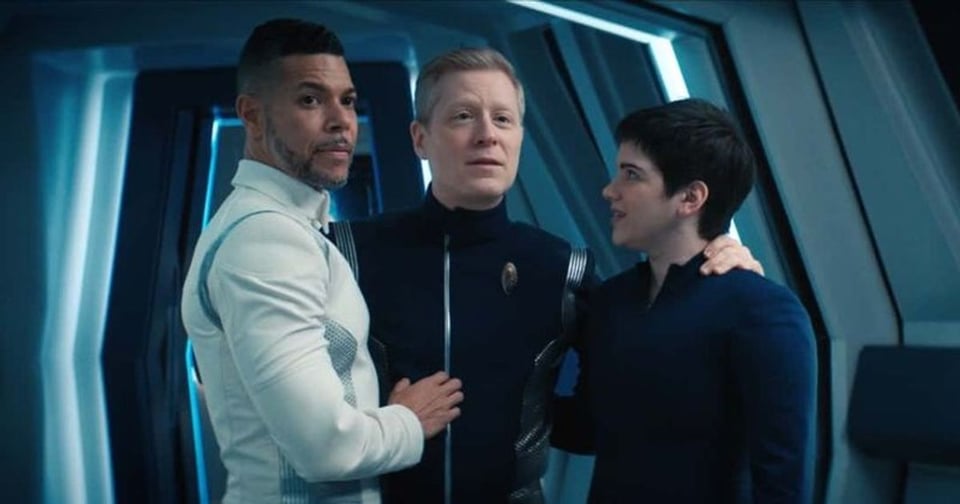
A lot has been written about just how gay Discovery really is, from Stamets and Culber's marriage to the T4T relationship of Gray and Adira to Tilly's lesbian fungus fling. Plus, again, there's Jet Reno. But the thing I really love about Discovery, going into its final season, is just how much beautiful romance there is across the board in this show — even besides the stuff I just mentioned. Saru has been having a whirlwind courtship with T'Rina, the president of Ni'Var, which is the reunified Vulcan and Romulan homeworld. And Captain Michael Burnham has a stormy on-again-off-again love affair going with Book, a smuggler she met when she first arrived in the 32nd century — I'm really rooting for those two to work out their problems, because they have ridiculous chemistry. I'm not used to seeing Star Trek put romance front and center for so many of its major characters, and I love it.
Finally, the thing I love about Discovery is how its characters have been allowed to change and grow, something the first two episodes of season five take great pains to remind us of. Out of the characters who've been there since the first season, none of them is the same person they used to be, and we've gotten to see them evolve over time. In particular, there's a huge emphasis on redemption arcs, which is a subject close to my heart. Michael Burnham starts Discovery as a disgraced mutineer, and is now a highly respected captain with a twinkle in her eye. But a lot of these characters have been allowed to make terrible mistakes and learn from them, becoming better people as a result.
When people call Star Trek an optimistic show, I don't think they're just talking about fancy technology. I believe Star Trek's true power is its optimism about people: our ability to keep being better than we were, and to choose kindness and understanding over brute force. More than any other Star Trek show right now, Discovery exemplifies this belief in our potential as a species, which is something that I personally really need right now.
Stuff I Love This Week
I Don't see too many movies in theaters anymore, thanks to this whole "pretending a pandemic is over what it really isn't" thing we're doing right now. Off the top of my head, I've seen Shang-Chi, The Marvels, Everything Everywhere All at Once, Godzilla Minus Zero, and one or two other films in theaters since 2020. I decided to make Monkey Man one of my few few theater-going experiences, and I'm so glad I did. Dove Patel directs and stars in an action movie that is uncomrpromisingly bloody and weird and kind of spiritual, and it's one of the coolest things I've seen lately.
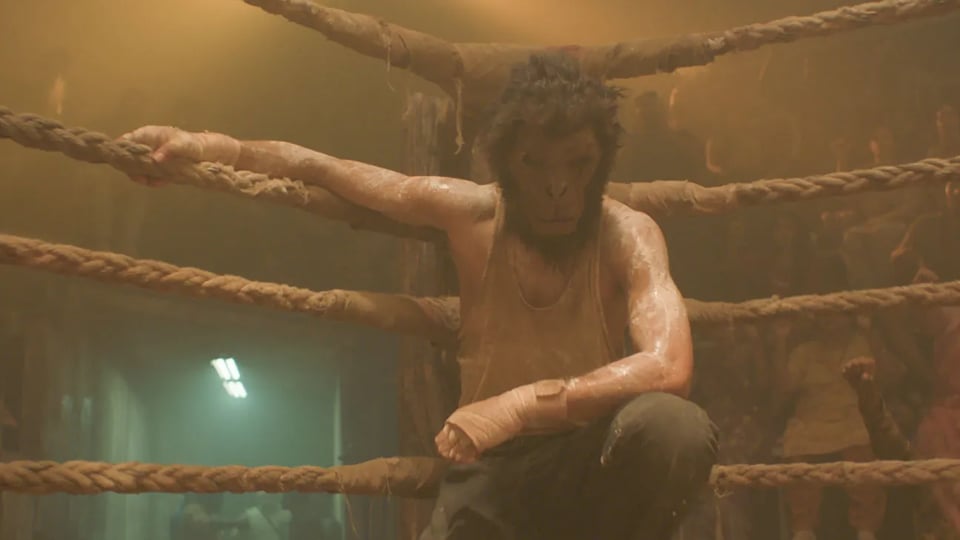
People have compared Monkey Man to John Wick, and it even includes a couple of John Wick Easter eggs — but this film feels much grittier to me, and much more nakedly political. The stuff involving India's third gender people, hijras, teaming up with the main character felt especially beautiful and moving given all of the moral panic going right now on right now about gender non-conformity. But in general, Monkey Man is simply an incredibly well made action movie, with fight scenes that feel thematic and load-bearing rather than just decorative. That said, there's a little too much shaky-cam in the first half. Still all in all, I highly recommend seeing this one in the theater.
Three Obituaries
Three people died in the past week or so, all of whom had a massive impact on my approach to storytelling and my love of absurdism.
Christopher Durang wrote honestly some of the most gonzo plays I've ever seen or read — he is competing with Caryl Churchill for the title of my favorite modern playwright. When I was in college, I got a slim paperback called Christopher Durang Explains Everything, which contains his first half dozen plays, and I still keep it handy. Some of them are not very good, but what they share is a completely off-the-chain commitment to weirdness and ridiculousness, including the utterly whack The Nature and Purpose of the Universe. Durang's later plays, such as Baby With the Bathwater, The Marriage of Bette and Boo, and Vanya and Sonia and Masha and Spike, keep that same focus on absolute nonsense, but build a stronger sense of drama and characters.
John Barth, meanwhile, wrote Giles Goat Boy, a satirical trippy novel that did a lot to shape my approach to science-fiction storytelling. Giles Goat Boy is a weird lampoon of the hero's journey, set in a college campus that is somehow also the entire world. I have to admit I read it a long time ago and my memory is hazy, but its tongue-in-cheek tone and formal experimentation made a huge impression on me and inspired me to screw around with narrative and structure way more. I've been meaning to reread it.
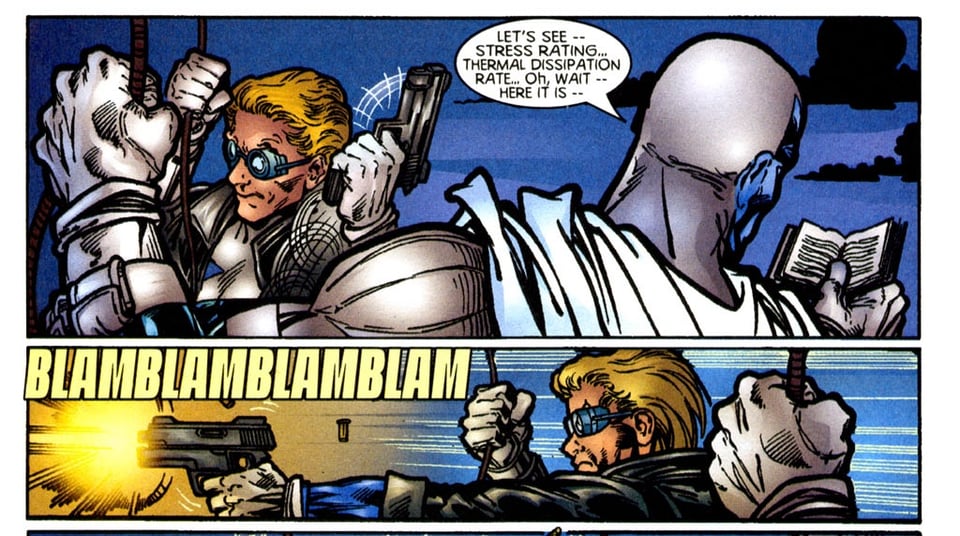
And finally, M.D. "Doc" Bright was a comic book artist who had incredible runs on Green Lantern and other superhero comics -- but more importantly, he was co-creator of Quantum and Woody, a hilarious, sometimes heartbreaking superhero comic written by Christopher priest, which deals with race and class through the lens of the friendship between two childhood friends (one Black, one white) who have become utterly terrible superheroes. The delightfully self-mocking, Quantum and Woody remains a foundational text for me as a sometime-writer of comics. It no longer feels like a deconstruction of superheroes, more like just a brilliant example of what the genre is capable of.
And oh my god, Bright's art is such a key ingredient. The distinctive way he drew faces, the expressiveness he put into every panel, is pure magic. The best comics art feels like acting, and Bright put on a comedy masterclass whenever he drew one of Priest's goofy scenarios — but he was also capable of putting so much anger and pathos on the page. Bright also was instrumental in creating Milestone Comics, which brought more Black creators into superhero comics but also helped change the vocabulary of the genre entirely.
All three of these guys — Durang, Barth, Bright — had a huge impact on my creative approach, and I'm sad I never got to meet any of them.
One More Shameless Plug
Did I mention today is the paperback of Promises Stronger Than Darkness? It's true. Don't let the "young adult" thing scare you — if you enjoy Star Trek, then this trilogy will probably be extremely very much your shit. Especially in the second and third books of the trilogy, I just cut loose and got freaky with as many wild science fiction concepts as I could come up with. Also, here's a promise: there are a ton of space battles in these books, but every single one of them is completely different, and each of them is an occasion for character development as well as fun tactics.